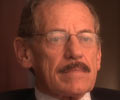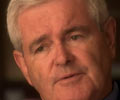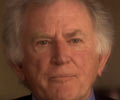- People
- Ron Brownstein
- Mark Salter
- Mark Halperin
- Elisabeth Bumiller
- John Weaver
- Ron Kaufman
- Charlie Cook
- Newt Gingrich
- Gary Hart
- Matt Bai
- Related Link
- The Fall of Conservatism
New Yorker writer George Packer surveys the history of conservatism and where McCain fits.
Ron Brownstein The National Journal; author, The Second Civil War

Part of the context for understanding McCain is that when Republicans took over Congress in 1994, and certainly once President Bush comes in, there is an enormous emphasis on party unity as the way to govern. ... It's about deepening support within the Republican coalition electorally and legislatively and much less focused on reaching out to voters beyond that base.
You see more primary challenges; you see more use of threats against Republicans who deviate too often from the party line, that they will lose their chairmanships. Routinely in the House, the Republican leadership passes over moderate members who have the most seniority to pick chairmen of committees.
That's really the backdrop in which McCain becomes such an unusual figure and such a figure of controversy and antagonism for conservatives.
Here's McCain continuing to hold to a course really from another era, where party leaders could pick and choose where they stand with their party or not. He's working with Democrats on a patients' bill of rights; he's working with Democrats on campaign finance reform; he's working with Democrats on immigration. He co-sponsors with [Sen.] Joe Lieberman [I-Conn.] a cap-and-trade bill on global warming that almost all Republicans oppose. He votes against the Bush tax cuts.
Now, his overall record is still very conservative, still a very high level of party loyalty, but he is conspicuous against this backdrop of increased partisan unity, of continuing to have and husband and nourish this maverick image as someone who will break from the party.
Mark Salter Senior adviser to John McCain
 Read the full interview >
Read the full interview >
He had made peace with [the late Rev. Jerry] Falwell. What was that all about?
Rev. Falwell came to see him, said, put our past differences behind us, or acrimony behind us, or something; and then asked him on the spot if he would consider giving the commencement address at Liberty [University, founded by Falwell]. And he responded on the spot, "Sure." It's not really too calculating. And it was fine. He usually does several commencements a year when he was in the Senate, anywhere from two to four, I guess. ...
And how about you guys on the staff, when he walks out and says, "I've just agreed to go do the commencement at Liberty University"?
Nobody litigated or anything. Obviously we recognized that people will take that in some symbolic way, but what if he weren't running for president? That's the thing you've got to kind of remember about him or learn to live with if you work for him. ... He is not going to really do things that much differently as a candidate for president, even as the nominee, than he would otherwise.
Even if it looks like he's blessing Falwell and those guys, that it might have a meaning?
Sure. Look at both the Liberty speech and the [2000] Virginia Beach speech. We let Virginia Beach become about three people, and it wasn't. Remember, we were fighting about the role of soft money in campaigns at the time, and a lot of the opposition that John had gotten from social conservatives in South Carolina was over soft money. ...
But because we put Rev. Falwell, Pat Robertson's name in it, it became about that. I think that was a mistake. ...
Of course it was about soft money, but Falwell and [others] were also sending a little message to McCain, right?
Sure, but he ran afoul of a lot of groups. The National Right to Life -- here he's got a solid pro-life voting record, but the National Right to Life at that time were quite a thorn in his side, and it was over McCain-Feingold.
National Rifle Association -- perfectly solid record on Second Amendment issues. [It's] basically over McCain-Feingold. That act of bipartisan problem solving managed to upset quite a number of constituencies of the Republican Party.
Mark Halperin Time magazine; co-author, The Way to Win
 Read the full interview >
Read the full interview >
A lot of people look at what McCain did in reaching out to religious conservatives and reaching out to people and groups that he'd rejected in the past and said: "This is hypocritical. This is a deal with the devil." I think John McCain basically matured, and he saw that these groups were an important part of the Republican Party; that it didn't mean that he was endorsing everything they'd ever said or believed, but that they were an integral part of reaching out and finding a way to get elected.
Was part of it cynical? Was part of it calculating? No question. But I don't think he did it in a way that was uncomfortable for him, because I don't think John McCain is very good at doing that. He seemed to accept the fact that the Republican Party was bigger than just John McCain's maverick band of rebels.
Elisabeth Bumiller The New York Times

What was the problem with the base? ...
There were a lot of problems. He had opposed the original Bush tax cuts, and he had opposed them for a really problematic reason for conservatives: He said they were too geared to the rich; this is heresy. He had also what they considered a very liberal, left-wing position on immigration, which was to provide a pathway to citizenship for some of the illegal immigrants to the United States.
The other thing they kept talking about was his flirtation with [Sen.] John Kerry [D-Mass.] in 2004 about possibly joining the Democratic ticket as the vice presidential candidate. They were very angry about that. Also, one thing I heard at CPAC [the Conservative Political Action Conference] ... was that McCain liked the press too much. Also, in 2001, he had flirted with actually leaving the Republican Party and becoming an independent. So you name it. There was a lot.
CPAC, you were there. ... Define the importance of it, and what takes place there?
The Conservative Political Action Committee's annual convention occurred just a few days after McCain had almost certainly wrapped up the nomination in Super Tuesday. It was in early February. I went to that, and it was an absolute zoo. It's at this hotel in Washington, and it was absolutely packed. There was just this buzz among the conservatives. They were so excited.
And McCain had to go and address the group and make nice to them, this group that had serious mistrust for him, if not outright hostility in some areas. But to the surprise of everyone, [former Mass. Gov. Mitt] Romney spoke and announced he was withdrawing from the race, and the group was crestfallen. Romney was a big candidate for this group. ...
And then it was McCain's turn to speak after Romney, and he tried to reach out. He said, "Look, I know we've disagreed on a number of issues, but you have to look back on my record and say that, over time, I have the record of a true conservative."
What was striking about it was here he was, the effective new standard bearer of the Republican Party, and he was booed the same time that he was cheered. I mean, it was about half and half. It was a rough crowd for him, and he had to do it.
John Weaver McCain chief political adviser, 1997-'07
 Read the full interview >
Read the full interview >
CPAC in February 2008, the annual convention of conservative activists, how does his reception at that event -- he was booed at one point -- define some of the problems he's got to deal with?
I'm one of the consultants who think that's overrated, quite frankly. They're a paper tiger within our party. But, from an imagery point of view, it gets to the malaise within our party.
We have a very disgruntled base. They're angry with the administration; they're angry with the Congress. And he's got to pay attention to that, clearly. And I think they did a pretty good job at that at CPAC. But that's the least of McCain's problems in this general election.
Because?
Because this election's going to be won by people between the 40-yard lines, between soft Republicans and independents and soft Democrats. The base will turn out to a certain degree regardless. You've got to work at it, but they're going to turn out. But we have a lot of disgruntled people who voted for Republican candidates who have no intention of doing so right now. And that's not our base. Those are not the people at CPAC.
Ron Kaufman Adviser, Romney campaign

Just like Barack Obama's got a problem with blue-collar workers and women and Hispanics among the Democrats because of Hillary Clinton's base, John McCain had some problem with some of the voters that were with Mitt Romney.
But in the end, I believe, it's nowhere near as big a schism as the press, in particular, and others like to make it out to be. The polls show that he gets a huge percentage of a conservative Republican base, 93, 94 percent, which is just where George Bush was in 2000. So people want to make a big deal out of that, that's terrific. But in the end, empirically, it's pretty hard to prove that he's not there.
They'll be there for John McCain, because in the end conservatives understand that this is that kind of important election. You have an option: John McCain and the most liberal Democratic nominee since [1972 presidential candidate Sen.] George McGovern [D-S.D.]. Those are your options. And that passion for John McCain will be there, in my opinion, in November.
Charlie Cook The Cook Political Report

Show me a Republican that [conservative talk radio hosts] Rush Limbaugh or Bill O'Reilly or Ann Coulter or Laura Ingraham really like, and I'd show you someone that wouldn't have a prayer of winning this election, not a chance. ...
McCain is running in the face of about a 50-mile-an-hour headwind. If you're a Republican candidate out there, can you expect McCain to have coattails? No, there's not going to be any McCain coattails. But does he kind of break things up? Does he take the anti-Bush hostility and the damage that's been done to the Republican brand, and does he kind of dilute it so that people aren't necessarily sucked under by their party label? I think that's all Republicans can hope for. ...
You can argue about whether he's really a conservative; you can argue about whether he's really a Republican. But the guy's got a chance of winning, and no other Republican would in this environment.
Newt Gingrich Former House speaker, 1995-'99 (R-Ga.)

I think what conservatives have to decide -- and I said this in CPAC two days [after McCain spoke there] -- was, if your choice is an Obama, you're going to fight 95 percent of the time, and an McCain you're going to fight 20 percent of the time. It's pretty irresponsible to decide it doesn't matter. Because, in fact, on Supreme Court nominations, on Cabinet offices, on the budget, on a very wide range of issues, there is an enormous difference between Obama and McCain.
Gary Hart Former senator, 1975-'87 (D-Colo.)

I think the Republican Party is in great disarray, and partly that's because of this cyclical theory. What happened was a traditional Republican Party that believed in fiscal responsibility, balanced budgets, keeping the government out of people's personal lives and caution in foreign interventions -- that was the Republican Party up until the age of Reagan -- ... it became a party of the Religious Right, in which the government got into people's personal lives; fiscal irresponsibility, where even [Vice President] Richard Cheney said deficits don't matter; and an aggressive, unilateralist, interventionist party. This age-of-Reagan coalition in the Republican Party is totally new and different than the traditional Republican Party.
Now, what do we have as a result of that 30- or 40-year experience? We have an awful lot of people saying: "I don't want the church running the government, and I don't want the government telling me how I can run my personal life, so butt out. Second, you made a mistake in Iraq; you didn't tell us the truth. We're in a disastrous war that's cost 35,000 casualties. Enough already. You've squandered the budget surplus, and you've driven us into huge deficits."
So John McCain now has one leg in the old Republican Party -- he is a traditional conservative, whatever Mr. Limbaugh and anybody else says -- and one leg in this neo-Republican Party of that coalition that has failed. And we have a Republican Party in great disarray.
Matt Bai The New York Times Magazine; author, The Argument

I think people misunderstand the dynamic of McCain's campaign here. We have certain orthodoxies that we've clung to for a long time as political observers and as people who work in politics. One of them is, you've got to unite the base of your party, particularly in conservative politics. Conservatives will absolutely stay home if they're not fired up. They've proven this in the past. They've got a good, hard-won reputation for it.
So all of the talk around CPAC or around the other issues McCain has as he cruises towards the nomination is, how's this guy going to unite his party? What's he's going to do? Rush Limbaugh's out there on the radio every day, telling people they'd be crazy to vote for this guy. What is John McCain going to do to keep his party together?
My sense, from talking to people, is that in the McCain world, they see some potential for problem here, but they also see a potential advantage. In order to win the presidency he's got to appeal to these independents who have always been with him. He's got to re-establish his credibility as an independent thinker. To have Rush Limbaugh out there, beating you up daily during Republican primaries, is a problem. To have Rush Limbaugh out there beating up you up daily eight weeks out of a general election? Not quite as much of a problem.
Now, if the election's going to be decided by a point, and a bunch of Republicans are going to stay home -- don't get me wrong, I don't think they're completely untroubled by it, particularly a guy like Limbaugh, because he has this huge following. But I think to a certain extent they see some of the attacks from the Republican base as bona fides for them. There's a benefit to it.
You want to unify the party enough so that you're getting your base of voters by and large out to the polls, but not at the cost of that credibility that he's earned over the years and that he needs to win the presidency. And so I think it's wrong to look at every criticism ... and say, "Wow, McCain has a problem with his base." McCain needs to have some problem with his base. The question is calibrating how much.